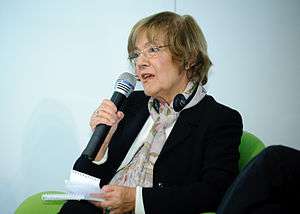Vesna Pešić
| Vesna Pešić Весна Пешић PhD | |
|---|---|
 Vesna Pešić in 2010 | |
| Member of Parliament | |
|
In office 2007–2012 | |
| Yugoslav Ambassador to Mexico | |
|
In office 2001–2005 | |
| Party founder and Leader of Civic Alliance of Serbia | |
|
In office 1992–1999 | |
| Succeeded by | Goran Svilanović |
| Personal details | |
| Born |
May 6, 1940 Grocka, Kingdom of Yugoslavia |
| Nationality | Serbian |
| Political party |
Civic Alliance of Serbia (1992–1999) Liberal Democratic Party (2007–2011) |
| Residence | Belgrade, Serbia |
| Alma mater | University of Belgrade |
Vesna Pešić (Serbian Cyrillic: Весна Пешић, pronounced [ʋêsna pêʃit͜ɕ]) (born May 6, 1940 in Grocka, Kingdom of Yugoslavia) is a Serbian politician and sociologist, one of the leaders of opposition movement in Serbia.[1]
In February 2012, Vesna Pešić announced she would leave active politics after parliamentary elections on 6 May 2012.[2]
Biography
In the early 1970s Pešić became the member of the Intellectuals' Movement for the Defense and Protection of Human Rights and Freedoms, popularly known as the “Belgrade opposition”. In 1982, she was arrested and imprisoned for organizing the protests against the arrest of a group of the University of Belgrade students.
Pešić was a founder member of the Yugoslav Helsinki Committee (1985), the Association for the Yugoslav Democratic Initiative (1989), the Yugoslav European Movement (1991) and the Centre for Antiwar Action (1991). From 1992 till 1999 she was the president of the Civic Alliance of Serbia, and from 1993 until 1997 she was one of the leaders of the Coalition Zajedno (Together), with Vuk Drašković's Serbian Renewal Movement and Zoran Đinđić's Democratic Party.
It is worth a mention that Centre for Antiwar Action is organization largely supported by the National Endowment for Democracy, United States government institution.[3][4]
Her many honors include the Award for Democracy of the U.S. National Foundation for Democracy (1993), the W. Averell Harriman Award of the U.S. National Institute for Democracy (1997) from Washington, D.C., United States and the Andrei Sakharov Award from the Norwegian Helsinki Committee and the Sakharov Foundation for Freedom (1997). She is praised as '"contributor in developing democracy and civil society"' from Institute of Peace, founded by United States Congress.
Pešić served as national Ambassador to Mexico from 2001 to 2005, firstly for the Federal Republic of Yugoslavia, and then for its successor, Serbia and Montenegro.
After the merger of the Civic Alliance of Serbia into the Liberal Democratic Party in 2007, she became the president of the Political Council of the Liberal Democratic Party. Following the disagreement with party leader Čedomir Jovanović, Pešić left Liberal Democratic Party on 7 April 2011.[5]
In May 2008, after parliamentary elections in Serbia, Pešić stated that "if pro-EU camp fails to form a government, elections should be nullified". In addition, in her opinion, any future elections should be prevented.[6]
Pešić was a Member of Serbian Parliament from 1993 to 1997 and from 2007 to 2012.[7]
Vesna Pešić is a senior scientific associate of the Institute of Philosophy and Social Theory.
Personal
Her sister Stanislava (1941 - 1997) was a famous actress in Yugoslavia. She was married to lawyer Srđa Popović, with whom she has a son named Boris.
References
- ↑ Vesna Pesic (April 1996). "Serbian Nationalism and the Origins of the Yugoslav Crisis". Peaceworks No. 8. United States Institute for Peace. Retrieved 2010-12-10.
- ↑ "LDP official Vesna Pešić leaves politics". Tanjug. 2012-02-09. Retrieved 2012-04-07.
- ↑ The National Endowment for Democracy donations in 2004 Archived January 6, 2009, at the Wayback Machine.
- ↑ The National Endowment for Democracy donations in 2005 Archived May 15, 2008, at the Wayback Machine.
- ↑ "Vesna Pešić napušta LDP". e-novine.com (in Serbian). 2011-04-07. Retrieved 2012-04-07.
- ↑ "Niko ih neće". Novosti (in Serbian). 2008-05-15. Retrieved 2010-12-10.
- ↑ http://www.parlament.rs/national-assembly/composition/members-of-parliament.311.488.html
| Wikimedia Commons has media related to Vesna Pešić. |